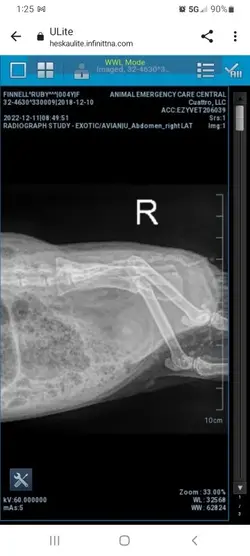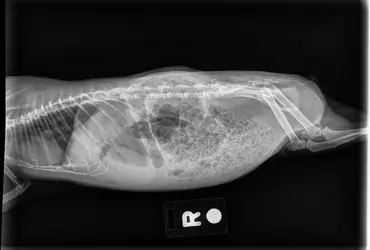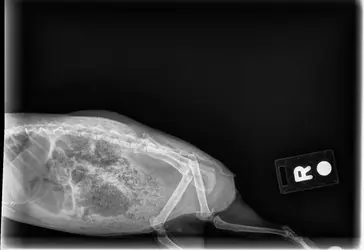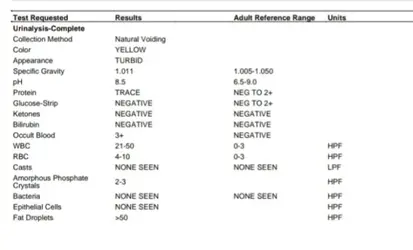StayGold86
New Born Pup
Hey guys,
I currently have a 4 or 5 year old female teddy pig that is having urinary issues. About a month ago, I noticed some very small blood droplets in her urine. Since then she has been to the vet multiple times. The first vet took an x-ray and said she had a stone. Second vet wanted to try to manage the stone and avoid surgery. Then finally I went to a third vet who is very experienced. He took more x-rays of her and did not find a stone. He also did a ultrasound and did not find anything (no stone or ovarian cysts). So, I decided to capture her urine and have it sent to a lab. The results said there were no calcium carbonate crystals, no bacteria, but there were traces of blood. The blood droplets seem to happen at night when she sleeps in her sleeping bag. The vet thinks that she has cystitis and has prescribed Metacam (I believe .2mL up to 2x a day). I will upload pictures of the x-rays and urine test results later today. Here is her current diet at the moment to try to help her Cystitis:
1. One Oxbow joint cookie per day (90mg glucosamine, will be switching to 1 capsule of Cystease per day).
2. Half Oxbow urinary cookie per day (~22mg glucosamine)
3. Bene-Bac (probiotic) pea size serving once a day.
4. Always been on Reverse Osmosis water.
5. Was on Sherwood pellets and no vegetables but she is currently not on any pellets.
6. Orchard Grass Hay mixed with Timothy Hay (no limit, they get as much as they can eat).
7. Sherwood Preventative Tablets (2 in the morning, 2 at night total of 88mg glucosamine). I grind them up and mix them with 5mL of water and syringe feed (they love it).
Things I have noticed that may help others possibly:
1. An all hay diet dramatically increases their water intake. They are constantly drinking water and this is helping flush out their bladders.
2. Removing pellets in the evening reduces the amount of sludge they generate during the night. My pigs are less active during the night and if they have access to pellets, their sludge increases. I would recommend removing pellets in the evening for any pig owner. It is a simple habit that can help urinary issues in the long term. If they are on a non vegetable diet, they will flush out the high calcium from the pellets (during the day) because they're drinking more.
3. Seed heads tend to cause sludge. Try to feed these during the day only.
4. Sherwood claims that calcium is not the sole culprit of calcium carbonate stones. It is the urine pH imbalance. Diets high in vegetables create an alkaline pH which lends itself to stones. Due to an alkaline pH, the body tries to compensate by creating carbonate. The carbonate then bonds to the calcium in the urine and creates stones.
5. Sometimes I try to separate the pigs at night to manage stress levels for the pig with Cystitis.
Currently, she seems to be very happy and she is eating, urinating, and pooping well. My plan is to have her get another x-ray, ultrasound, and urine test soon and see what the results are. I've learned that these piggies are tricky and nothing is certain. So for now, I am lucky to just have her in my life for another day. I wanted to post this, so that it can help someone else out.
Any input is appreciated.
I currently have a 4 or 5 year old female teddy pig that is having urinary issues. About a month ago, I noticed some very small blood droplets in her urine. Since then she has been to the vet multiple times. The first vet took an x-ray and said she had a stone. Second vet wanted to try to manage the stone and avoid surgery. Then finally I went to a third vet who is very experienced. He took more x-rays of her and did not find a stone. He also did a ultrasound and did not find anything (no stone or ovarian cysts). So, I decided to capture her urine and have it sent to a lab. The results said there were no calcium carbonate crystals, no bacteria, but there were traces of blood. The blood droplets seem to happen at night when she sleeps in her sleeping bag. The vet thinks that she has cystitis and has prescribed Metacam (I believe .2mL up to 2x a day). I will upload pictures of the x-rays and urine test results later today. Here is her current diet at the moment to try to help her Cystitis:
1. One Oxbow joint cookie per day (90mg glucosamine, will be switching to 1 capsule of Cystease per day).
2. Half Oxbow urinary cookie per day (~22mg glucosamine)
3. Bene-Bac (probiotic) pea size serving once a day.
4. Always been on Reverse Osmosis water.
5. Was on Sherwood pellets and no vegetables but she is currently not on any pellets.
6. Orchard Grass Hay mixed with Timothy Hay (no limit, they get as much as they can eat).
7. Sherwood Preventative Tablets (2 in the morning, 2 at night total of 88mg glucosamine). I grind them up and mix them with 5mL of water and syringe feed (they love it).
Things I have noticed that may help others possibly:
1. An all hay diet dramatically increases their water intake. They are constantly drinking water and this is helping flush out their bladders.
2. Removing pellets in the evening reduces the amount of sludge they generate during the night. My pigs are less active during the night and if they have access to pellets, their sludge increases. I would recommend removing pellets in the evening for any pig owner. It is a simple habit that can help urinary issues in the long term. If they are on a non vegetable diet, they will flush out the high calcium from the pellets (during the day) because they're drinking more.
3. Seed heads tend to cause sludge. Try to feed these during the day only.
4. Sherwood claims that calcium is not the sole culprit of calcium carbonate stones. It is the urine pH imbalance. Diets high in vegetables create an alkaline pH which lends itself to stones. Due to an alkaline pH, the body tries to compensate by creating carbonate. The carbonate then bonds to the calcium in the urine and creates stones.
5. Sometimes I try to separate the pigs at night to manage stress levels for the pig with Cystitis.
Currently, she seems to be very happy and she is eating, urinating, and pooping well. My plan is to have her get another x-ray, ultrasound, and urine test soon and see what the results are. I've learned that these piggies are tricky and nothing is certain. So for now, I am lucky to just have her in my life for another day. I wanted to post this, so that it can help someone else out.
Any input is appreciated.
Last edited by a moderator:



